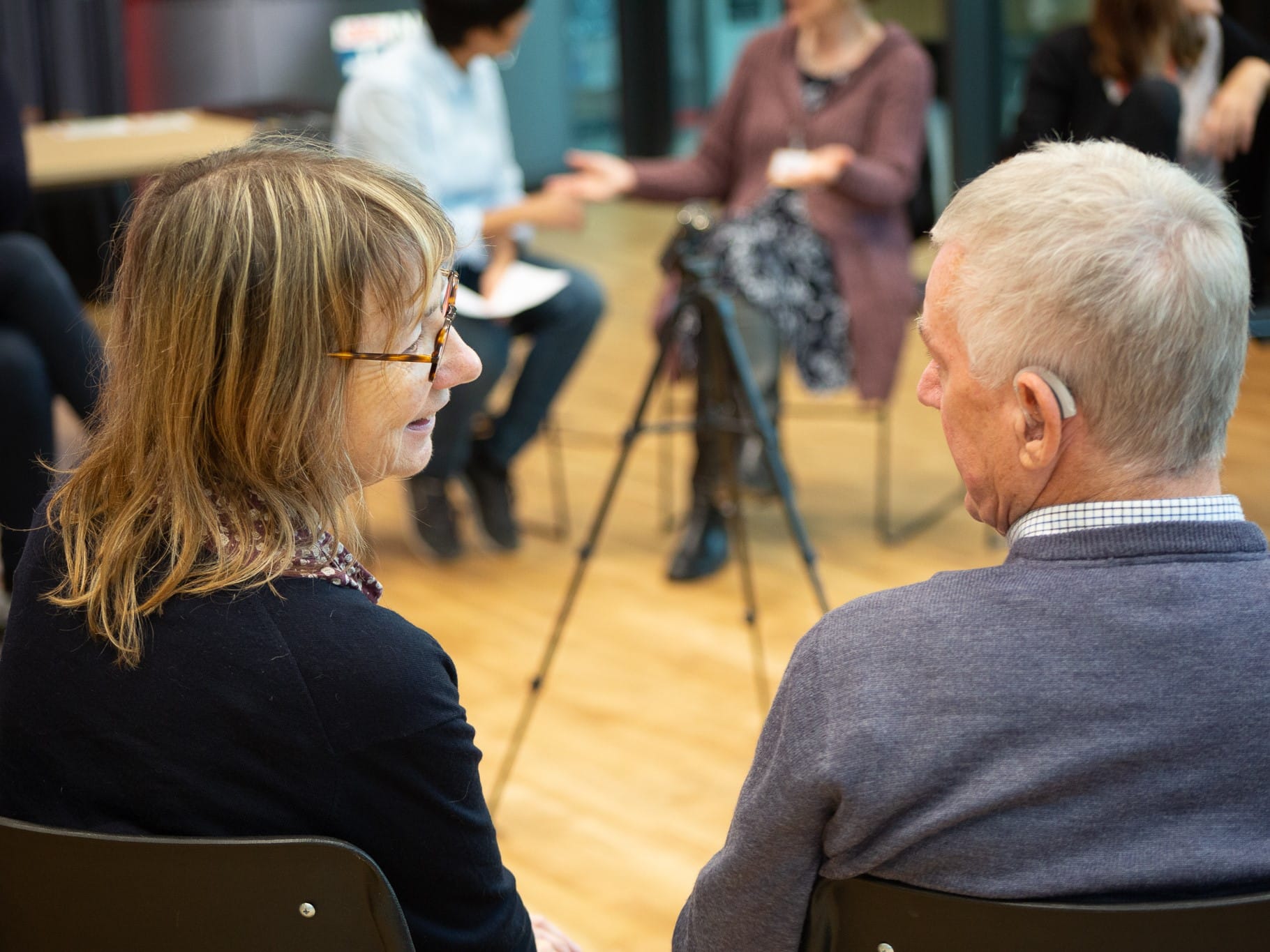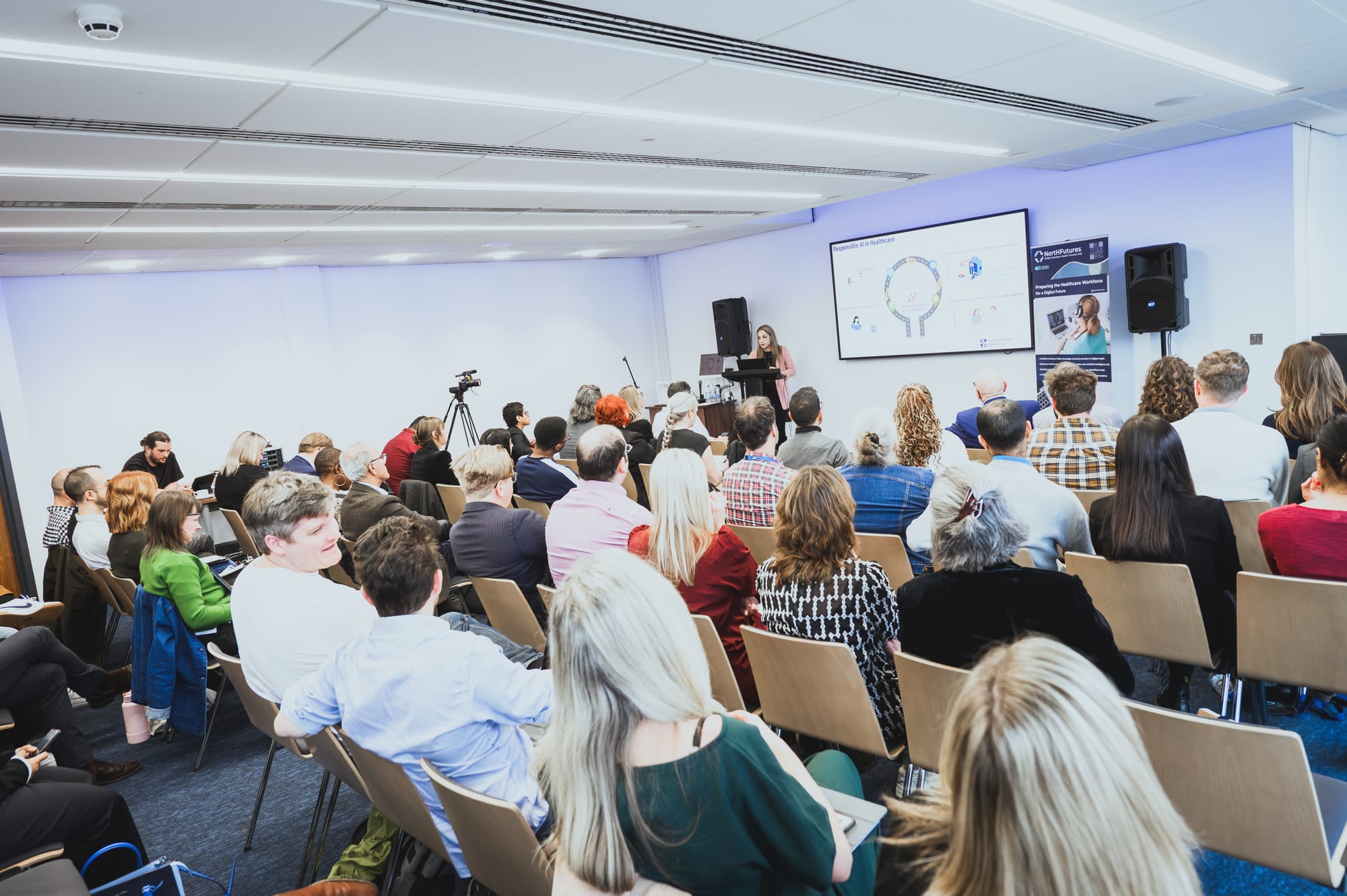NortHFutures has funded 15 research project teams working across sectors to address health challenges facing North East and North Cumbria. £800k of funding was allocated to projects across four research themes:
- Digital Surgical Pathways (preparing for and following an operation)
- Living and Ageing Well with Multiple Long-term Conditions
- Health and Nutrition in Children and Young People
- Mental Health and Wellbeing
The North of England faces significant health inequalities, with lower life expectancy, higher infant mortality, and poorer health outcomes compared to the rest of the country. Addressing these challenges requires collaboration across sectors to ensure that digital health research and innovation is inclusive and community-centred.
Our goal is to widen participation in digital health research and innovation, ensuring that those most affected by health inequalities have a seat at the table.
Our approach generated 271 Expressions of Interest, resulting in 116 workshop participants, with 24% representing VCSE organisations. From these sessions, 34 initial research ideas were developed, translating into 24 formal funding applications. Following a careful review process and meeting of a cross-sector Research Board, we funded 15 research projects.
Summary of funded projects
Living and Ageing Well with Multiple Longterm Conditions

Empowering Voices: A Pilot Project Exploring the Impact Of Digital Storytelling On Older Adults With Multiple Long-term Conditions
Project Lead: Stephen Dunne, Northumbria University
Project Team: Helen Cartner, Northumbria University; Douglas Hunter, Equal Arts (VCSE); Beverley Brannen, Gateshead Council; Dawn Reid, Mulgrave Villas, Gateshead; Carole Johnson, Mulgrave Villas, Gateshead
Summary: This project aims to collaborate with older people in the North-East living with multiple long-term conditions to develop ways of communicating their conditions through digital storytelling. The goal is to help them feel more valued and included and to help others understand their experiences.
Public and Third-sector Research Priorities to Address the Integration of Health and Social Care in County Durham
Project Lead: Matthew Cooper, Newcastle University
Project Team: Liz Fisher, Pioneering Care Partnership (VCSE); Rachel Stocker, Newcastle University; Claudio Angione, Teesside University; Adam Parnaby, Sole Trader; Soraia Sousa, CNTW NHS Foundation Trust
Summary: This project aims to improve health and social care support for people in County Durham living with multiple long-term health conditions. It will use a Delphi study to understand the main challenges and set practical recommendations for better integration of care.
Exploring the Role of Digital Health Technologies for Remote Monitoring of Patients with Frailty in NENC's Hospital at Home/Virtual Wards Initiatives
Project Lead: Jake McClements, Newcastle University
Project Team: Beth Bareham, Newcastle University; Chloe Hinchcliffe, Newcastle University; Grant Trewartha, Teesside University; James Futter, NHS; Ross Armstrong, Cumbria; Selin Barnett, Hippo Digital; Darren Hutton, Hippo Digital; Hilary Jamieson, Age UK (VCSE); Alex Mitchell, Voice Global (VCSE); Ann Thompson, Voice Global (VCSE); Joanne Kennedy, Voice Global (VCSE)
Summary: This project will identify and evaluate digital technologies for remote monitoring of patients with frailty. It aims to assess the acceptability of these technologies through workshops with patients, carers, and healthcare providers.
Exploring Storytelling Methodologies to Support Young People with Long-term Conditions to Inform Health Service Design and Improvement
Project Lead: Clare Murphy-Morgan, Northumbria University
Project Team: Joy Shao, Northumbria University; Louise Brennan, Newcastle Council; David McCreedy, Youth Focus NE (VCSE); Katie Aitken-McDermott, Rural Design Centre (VCSE)
Summary: This project will explore creative and inclusive storytelling methods to support young people with long-term conditions in sharing their lived experiences. The aim is to help them communicate their needs to healthcare providers and inform health service design and improvement.
Co-designing and Piloting a Community Peer Support Intervention for Adolescents and Young Adults with Long-term Health Conditions
Project Lead: Flora McErlane, Newcastle upon Tyne Hospitals NHS Foundation Trust
Project Team: Victoria Harbottle, Newcastle upon Tyne Hospitals NHS Foundation Trust; Jessica Collins, Northumbria University; David McCreedy, Youth Focus NE (VCSE); Tim Rapley, Northumbria University
Summary: This project aims to design and test a peer support intervention for adolescents and young adults with long-term health conditions. It seeks to improve engagement with healthcare and support the transition to independent adulthood.
Mental Health and Wellbeing

Improving Mental Health Services for Young People in Gateshead: Effective Methods for Sharing Information and Best Practices
Project Lead: John Young, Teesside University
Project Team: Kevin Franks, Youth Focus NE (VCSE); Marie Marron, South Tyneside and Sunderland NHS Foundation Trust; Midge Ryall, Unfolding Theatre (VCSE); Annie Rigby, Unfolding Theatre (VCSE); Andie Reynolds, University of Edinburgh
Summary: This project investigates how early intervention services in Gateshead share information and best practices to improve mental health outcomes for young people. It aims to develop a framework for a digital resource to streamline collaboration and enhance service efficiency.
Bridging the Gap: Identifying Barriers and Enablers to Marginalised Groups Accessing Digital Mental Health Services in the North East and North Cumbria
Project Lead: Joy Shao, Northumbria University
Project Team: Donna Sheavills, Pioneering Care Partnership (VCSE); Angela Dinsdale, Sunderland Counselling Service (VCSE); Paula Meale, Pioneering Care Partnership (VCSE); Colleen Pattison, South Tyneside and Sunderland NHS Foundation Trust; Dorothy Monekosso, Durham University; Andrew Fletcher, Northumbria University; Darren Flynn, Northumbria University
Summary: This project will gather first-hand accounts from refugees, asylum seekers, and ethnic minorities to identify challenges and enablers of accessing digital mental health services. The findings will inform regional mental health initiatives and support healthcare providers, policymakers, and digital health designers to improve service accessibility and inclusivity.
Digital Influence and Masculinity: The Impacts of Digital Environments on Vulnerable Young Men's Wellbeing and Empowerment
Project Lead: Cristina Costa, Durham University
Project Team: Rhoda Morrow, Gladstone Terrace Centre for Young People (VCSE)
Summary: This project explores how vulnerable young men engage with the digital world and the impacts on their self-worth and mental health. It aims to empower young men to build positive digital relationships, increase awareness of online influences, and cultivate supportive communities.
Exploring the Role of Digital Solutions on Mental Health in Junior Sports: Enhancing Coach Education
Project Lead: Adam Coussens, Newcastle University
Project Team: Oliver Shannon, Newcastle University; Victoria Cowens, NHS; Tracie Donachie, Newcastle University; Max Stone, Newcastle University; Dan Martin, Newcastle University; Iain MacLeod, Eagles Community Foundation (VCSE)
Summary: This project aims to empower coaches with knowledge around mental health literacy and provide tools to support junior athletes' mental health. It focuses on addressing mental health challenges faced by junior athletes and enhancing coach education.
What Matters to You: Commissioner-defined Versus Person-centred Approaches to Mental Health Intervention Outcomes
Project Lead: Chris Bull, Newcastle University
Project Team: Andy Cox, Transmit Enterprise CiC Trading as SIGNAL (VCSE); Carol Egdell, Tyne Housing Association (VCSE); Robyn Holmes, Age UK County Durham (VCSE); Toby Sweet, Sunderland Counselling Service (VCSE)
Summary: This project focuses on improving mental health support by shifting the focus to personal goals and unique needs of service users. It aims to develop and test person-centred tools to capture each person’s priorities and demonstrate the benefits of a people-powered approach.
Digital Surgical Pathways

Optimisation of a Co-produced Multibehavioural Digital Prehabilitation Intervention for Patients Preparing for Major Surgery
Project Lead: Alasdair O'Doherty, Durham University
Project Team: Leah Avery, Teesside University; Dorothy Monekosso, Durham University; Suncica Hadzidedic, Durham University; Rebecca Livingston, Teesside University; Gerard Danjoux, South Tees Hospitals NHS Foundation Trust; James Durrand, South Tees Hospitals NHS Foundation Trust; Akhil Lakhani, South Tees Hospitals NHS Foundation Trust; Paul Court, Healthworks NE (VCSE)
Summary: This project aims to optimise engagement and user experience of iPrepwell, a digital platform co-developed with patients and practitioners to make lifestyle changes before major surgery. The project will evaluate the platform and gather feedback to improve its usability and effectiveness.
Development and Feasibility Testing of BAUS PCNL Outcome Prediction Tool (POPT)
Project Lead: Rob Geraghty, Newcastle University
Project Team: Michael Drinnan, Teesside University; Rebecca Porta, The Urology Foundation (VCSE); Alistair Rogers, British Association of Urological Surgeons / Freeman Hospital (VCSE)
Summary: This project aims to test and develop an AI app for predicting individual risks associated with Percutaneous Nephrolithotomy (PCNL) surgery. The tool will be tested using local data, and a website will be developed for clinicians and patients to use. The goal is to prepare the app for general clinical use.
Health and Nutrition in Children and Young People

Personalised Diet Application for Improving Diet Quality of Older Adults in the North-East of England: Key Competitor Analysis, Acceptability Testing, and Co-design
Project Lead: Ellie Hayes, Northumbria University
Project Team: Bernard Corfe, Newcastle University; Aisha Purvis, Sensmart; Roisin Devaney, Newcastle University; Oliver Shannon, Newcastle University; Megan Hardiman, The Elders Council (VCSE)
Summary: This project will co-develop a personalised digital application to provide evidence-based dietary support for older adults. It will include population and disease-specific advice to help older adults make healthy dietary changes.
Exploring and Evidencing Food Insecurity and Eating Distress in the North East of England
Project Lead: Dawn Branley-Bell
Lead Institution: Northumbria University
Project Team: Emma Giles, Teesside University; Claire Murphy-Morgan, Northumbria University; Anne Fry, Eating Distress NE (VCSE); Victoria Nunn, Northumbria University; Viana Nijia Zhang, Newcastle University; Joe Scrase, The Bay Foodbank (VCSE); Tracey Godfrey, Middlesborough Foodbank (VCSE)
Summary: This project explores the link between food insecurity and eating distress in North-East England. It aims to highlight the connection and provide evidence to support healthcare providers, policymakers, and community organisations in addressing these issues.
Improving Health and Education Outcomes for Children and Families with Avoidant Restrictive Food Intake Disorder (ARFID)
Project Lead: John Young
Lead Institution: Teesside University
Project Team: Anne Fry, Eating Distress NE (VCSE); Penny Day, XR Therapeutics; Dr. Morag Maskey, XR Therapeutics
Summary: This project will co-produce a digital educational tool to inform educational and healthcare professionals about ARFID. It aims to improve understanding and support for individuals with ARFID and their families
Innovative Approaches to Collaboration
Ensuring broad participation required rethinking traditional funding mechanisms. EPSRC regulations typically prevent VCSE organisations from directly holding funds, which can limit their ability to contribute meaningfully to research. To address this, we developed and evaluated a novel, compliant funding approach that ensured fair compensation for VCSE partners whilst maintaining research integrity.
We worked alongside six university representatives, our collaborators at Voluntary Organisations Network North East (VONNE), and our hub Research Involvement Advisory Group composed of experts in public, patient, and community involvement from across the region. We designed a process that lowered barriers to participation for organisations and individuals new to research. Key elements included:
- A structured expression of interest process to curate workshop attendance, ensuring diversity in sector representation and experience;
- Carefully scoped workshops, held in community spaces to balance participation opportunities with the significant capacity challenges faced by the VCSE sector;
- VCSE organisations as research partners, as a condition of funding;
- Targeted training to equip teams with skills in research planning, question development, impact assessment, and stakeholder management;
- Ongoing support through post-workshop webinars, helping teams navigate meaningful engagement with the VCSE sector and address ethical considerations in health and care research;
- A Research Board that reflected the diversity of our hub stakeholders.
Through reimagined engagement strategies and fairer funding mechanisms, we are paving the way for a more inclusive and sustainable approach to digital health research.
“The work of NortHFutures has embedded an inclusive approach from the outset, at its heart is a true co-design ethos which has created an opportunity for VCSE organisations to shape research for the benefit of the communities they work with and within. This is a brilliant opportunity to change the landscape of health research for the better, and I am excited to see how it progresses.” – Lisa Taylor, Health and Wellbeing Programme Director, VONNE
By fostering equitable, long-term partnerships, NortHFutures is not only advancing the national NHS Core20PLUS5 agenda but also shaping the future of research funding to be more inclusive, impactful, and community-centred.
Our ongoing work will continue to inform funders like EPSRC and UKRI, helping to reshape strategic priorities around research accessibility and participation.
While we couldn’t fund every application, we’re committed to supporting more teams in developing their proposals for future funding opportunities. To do this, we’re planning a series of initiatives to help strengthen and refine these ideas, increasing their chances of securing alternative funding.
For more information get in touch with NortHFutures Programme Manager, Jennifer Wood: jennifer.wood@newcastle.ac.uk

